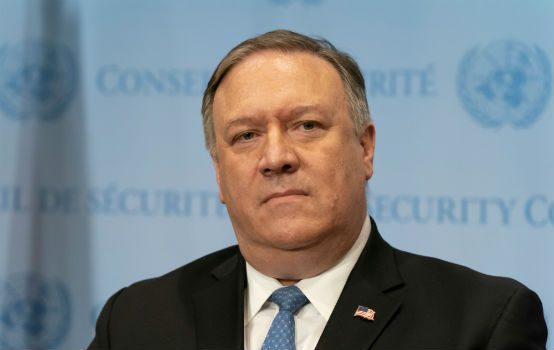Pompeo’s Allergy to Tough Questions

It is fitting that the Secretary of State who boasts about bringing “swagger” to U.S. diplomacy should be the most hypersensitive snowflake when it comes to tough and challenging questions from the press:
I asked Peru’s foreign minister what he might do if sanctions against Maduro start negatively impacting the humanitarian situation in Venezuela. Pompeo stepped in & said I “shouldn’t ask questions like that” & accused me of blaming the crisis on the US. I didn’t, but you decide: pic.twitter.com/6rVJp8iF4Y
— John Hudson (@John_Hudson) April 14, 2019
Pompeo shouldn’t have interrupted before his colleague could answer, and he was wrong to attack the journalist for asking a fair and legitimate question about the effort to force Maduro from power. This isn’t an isolated episode for Pompeo, but fits into a pattern of berating reporters for doing their jobs that goes back to the early days of his tenure at State. The Secretary of State has an allergy to tough questions, and he bristles at the slightest criticism of the administration’s destructive and questionable policies. This is one of the many things that distinguishes Pompeo as one of the worst Secretaries of State in recent memory:
I covered three Secretaries of State, and all three of them at times disliked my questions. But never once did they step in like this to berate the reporter. Total lack of class displayed by Pompeo and zero understanding of the media's role. https://t.co/GUmkNCqKE7
— Glenn Kessler (@GlennKesslerWP) April 14, 2019
Asking questions "like that" is a badge of honor in a free society. Pitiful that @SecPompeo isn't familiar with the First Amendment & the vital role of the press in a democratic system. And kudos to @john_hudson! https://t.co/nRonuK68hO
— Suzanne Maloney (@MaloneySuzanne) April 14, 2019
I first noticed his habit of objecting to “ridiculous” and “ludicrous” questions last summer when he was busy spinning the lack of results from the Singapore summit. He was asked why the summit declaration included no details about verification, and in addition to calling it ridiculous and ludicrous he dismissed the question as “silly.” This is what I wrote about that at the time:
It is appropriate and indeed necessary for people to raise questions about what the government is doing, and it is not “silly” to point out flaws and omissions when they actually exist. If most observers are emphasizing that the statement released after Tuesday’s summit was weak and lacking in specifics, that is because the administration is trying to sell it as a major success. It is the job of journalists and experts to question official claims and to challenge them when they are false. If Pompeo doesn’t like “insulting and ridiculous” questions, perhaps he and the president should not say ridiculous things that insult the intelligence of informed people.
When he was called out last fall for issuing the bogus Yemen certification over the objections of department officials to protect current and future arms sales to the Saudis, he took offense that someone would dare point out what he had done. The Secretary of State has done this so many times since then that has become impossible to miss:
When pressed by journalists on the administration’s policies, Pompeo — especially in recent months — acts highly defensive. He has regularly cut off reporters, dismissing their questions as “ridiculous” or otherwise expresses his impatience, tsk-tsking reporters by repeating their first names.
In the latest episode, Hudson was raising a fair point about the potential negative consequences of U.S. sanctions, and he was asking the Peruvian foreign minister whether the governments aligned against Maduro would consider changing their approach if the humanitarian crisis grew worse as a result of the sanctions. Pompeo didn’t want to hear what his colleague had to say because he was in such a hurry to shoot the messenger for his supposed “lack of understanding.” The adverse effects of sanctions on the civilian population has been a chief concern of critics of administration policy, and it was absolutely appropriate to ask one of the regional governments involved to explain their position.
Because Pompeo is a bully and an ideologue, he likes denigrating journalists publicly and he wants to shut down any line of inquiry that might contradict his assertions that “America is a force for good.” Like many hawks, Pompeo isn’t interested in talking about the possible downsides to U.S. policy, and he thinks that the administration’s “deep intent” is all that matters. If U.S. sanctions contribute to starvation and disease in Venezuela, Pompeo won’t ever take responsibility because his “intent” was supposedly to help them. Hawks always want to be judged by their intentions as they portray them to us, and they never want to be held accountable for the consequences of what they do.
The fact that Pompeo always responds so defensively to the mildest questions about administration policies shows how out of his depth he is in his job, and his unconvincing responses underscore just how awful the policies he is trying to sell really are.
Comments